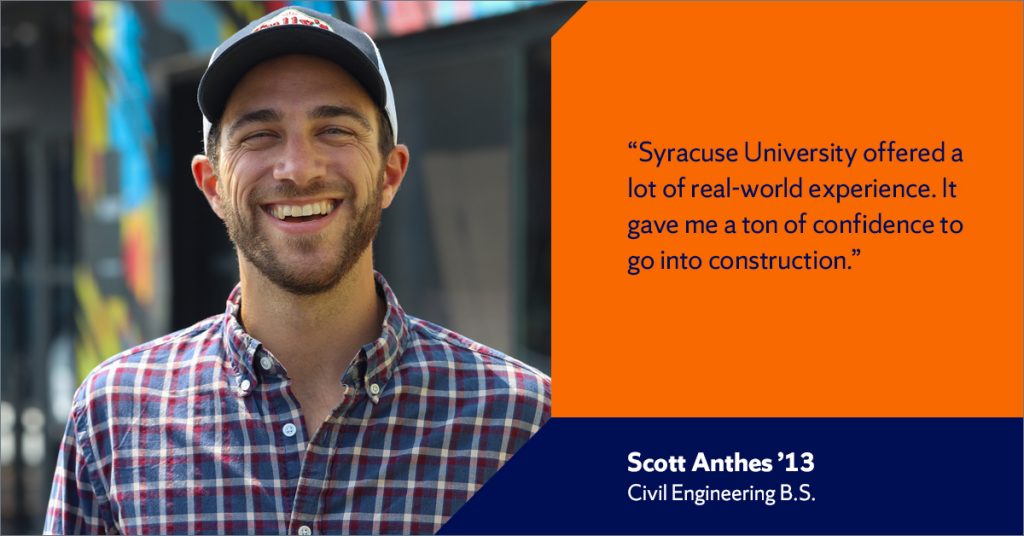Learn how to plan, design, construct, and maintain facilities for the public and private sectors such as buildings, bridges, tunnels, highways, transit, and water systems.
“The College of Engineering is big enough that you don’t see the same people every day but small enough that you can make connections with professors.”
Laverne Sessler ’16, G’17, Civil Engineering and Business
Your immersion in this broad engineering discipline will focus on sustainable and resilient engineering analysis and design, as well as effective written and oral communication skills.

Courses
Sample courses for civil engineering majors include:
- Sustainability in Civil and Environmental Systems
- Analysis of Structures and Materials
- Design of Steel and Concrete Structures
- Soil Mechanics and Foundation Engineering
- Construction Engineering and Project Management
- Geomatics and Transportation Engineering
- Fluid Mechanics and Water Resources
Practical Experience
- Your curriculum can be specialized to align with your desired career path – construction, environmental, geotechnical, or structural engineering. You can also pursue a minor in areas like economics, engineering management, architecture, mathematics, or other fields of engineering, to name a few.
- Collaborate with faculty on research projects at on- and off-campus institutes and labs, including the Construction Engineering Lab, the Structures/Materials lab, the Geofoam lab, the Geosynthetics lab, and the Center for Environmental Systems Engineering—22,000 square feet of core laboratories.
- The College of Engineering and Computer Sciences has 20 co-curricular organizations as well as student organizations like the Syracuse Chapter of the American Society of Civil Engineers, Engineers without Borders, National Society of Black Engineers, Society of Hispanic Professional Engineers, Society of Women Engineers, and Women in Science and Engineering.
- The Civil Engineering program is accredited by the Engineering Accreditation Commission of ABET, https://www.abet.org, under the General Criteria and the Civil and Similarly Named Engineering Programs Program Criteria.
- The 5-year H. John Riley Dual Engineering/MBA Program allows you to earn a bachelor’s degree in Civil Engineering and an MBA from Syracuse University’s Whitman School of Management.
Study Abroad
Broaden your perspective and enhance your resume with an international experience through Syracuse Abroad, with more than 100 programs in 60 countries.
Civil engineering students have the opportunity to enhance their academic learning experience by studying abroad in one of the Syracuse University Centers in Florence and Strasbourg, or through the World Partner Programs at the Chinese University of Hong Kong, University College Dublin, and the University of New South Wales.
Summer programs of interest include Engineering Research Projects in Strasbourg and a Construction Management class in Eastern Europe.
The Dubai Summer Internship program allows a select group of students to spend one summer month in Dubai, UAE to learn about the business and engineering practices of one of the world’s leading contracting and construction companies in the region.
Life After Syracuse University
As a College of Engineering and Computer Science graduate with a major in civil engineering, you have many options.
Including work in both the public and private sectors:
- Design firms
- Consulting firms
- Utilities
- Construction firms
Also, in government agencies:
- Departments of Transportation
- Thruway and Port Authorities
- Environmental Protection Agencies
- Departments of Public Works
You can also pursue graduate studies in areas such as construction engineering, environmental engineering, geotechnical engineering, and structural engineering, business administration, or law. Recent graduates of the program have attended some of the top graduate schools in the United States.
View program details in the University Course Catalog
Enrollment & Graduation Data, Program Educational Objectives, and Student Outcomes
